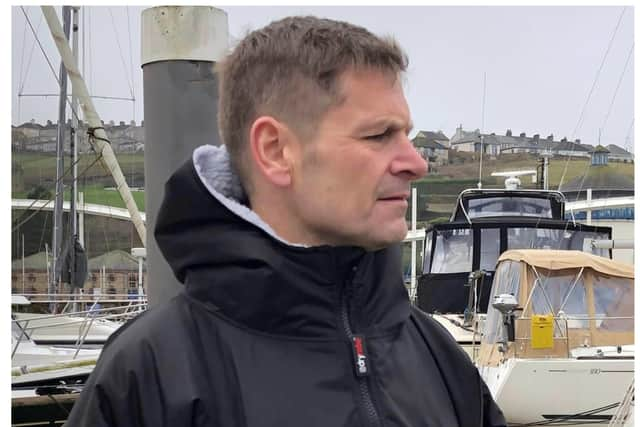Britain’s triathlon team forced to train in swimming pool instead of the sea over ‘horrible’ sewage pollution
and live on Freeview channel 276
Britain’s triathlon team for the upcoming world championships has been forced to abandon their open-water training off the coast of Lancashire due to “horrible” sewage pollution.
Adam Diver, a 46-year-old former army captain from Fleetwood, Lancashire, said the team had struggled to train off the coast of Fleetwood as a result of sewage spills that occurred in June.
Advertisement
Hide AdAdvertisement
Hide AdA “do not swim” warning was issued across a swathe of popular beaches along the Fylde coast after a pipe burst following a storm on Monday 12 June, causing raw sewage to overflow into the sea.
The affected beaches included Bispham, Blackpool, Cleveleys beach, Fleetwood and St Annes. A “pollution risk forecast or incident alert” is still being shown for the beaches along the Fylde coast on Surfers Against Sewage interactive map today (Thursday 3 August).
In June United Utilities said “urgent repair work” was being carried out on the burst pipe, adding that it “is expected to take some time”.
Diver told the Guardian that “you can smell” the sewage “especially on hot days” and “it is horrible and upsetting.”
Advertisement
Hide AdAdvertisement
Hide Ad

He told BBC Radio Lancashire the team have had to switch their training to an indoor swimming pool because of pollution in the Irish Sea.
He said it is “OK, but it’s not fantastic” as it is “really difficult to replicate what you’d do in open water into a pool”.
He added: “You just don’t get the same movement of the water.”
Diver, and his team-mates, Richard Addison and Paul Bamber, are preparing for next month’s championship finals in Pontevedra, Spain, after success in qualifying events.
Advertisement
Hide AdAdvertisement
Hide AdKevin Gray, the team’s safety adviser who tests the sea waters daily, said it was “absolutely paramount” that they replicate competition conditions by swimming in the open sea.
He said pollution is a “national problem when we look at our seas, rivers and coastal waters.”
He added: “The water firms are saying that the water’s safe. However, when we’re testing it we’re finding completely different results.
“Until we get confirmation it’s safe, we can’t really let Adam and the team out there.”
Advertisement
Hide AdAdvertisement
Hide AdThe triathletes recently travelled to the Lake District to replicate open-water conditions and make up for the lack of recent sea training and to replicate open-water conditions.
A spokesman for United Utilities said it has made “major investment along the Fylde coast to provide high-quality sewage treatment and to reduce the impact of storm overflows during heavy rain”.
The spokesman added that the water company plans to “build on this with further investment across the northwest to meet the new requirements of the Environment Act.”
A spokesman for the Environment Agency said it is “working with United Utilities who are exploring options to improve bathing waters across the Fylde coast” and is “absolutely clear that polluting our seas and rivers is unacceptable”.
Advertisement
Hide AdAdvertisement
Hide AdThe spokesman added that the agency routinely samples and monitors bathing water including at Fleetwood and the beach there “is a designated bathing water that was classified as ‘Good’ last year, based on testing over the previous four years.”
The agency advised the public to check Swimfo for the latest bathing water information. The website gives information on all 424 designated bathing water sites and any forecasted drops in water quality.
Comment Guidelines
National World encourages reader discussion on our stories. User feedback, insights and back-and-forth exchanges add a rich layer of context to reporting. Please review our Community Guidelines before commenting.
